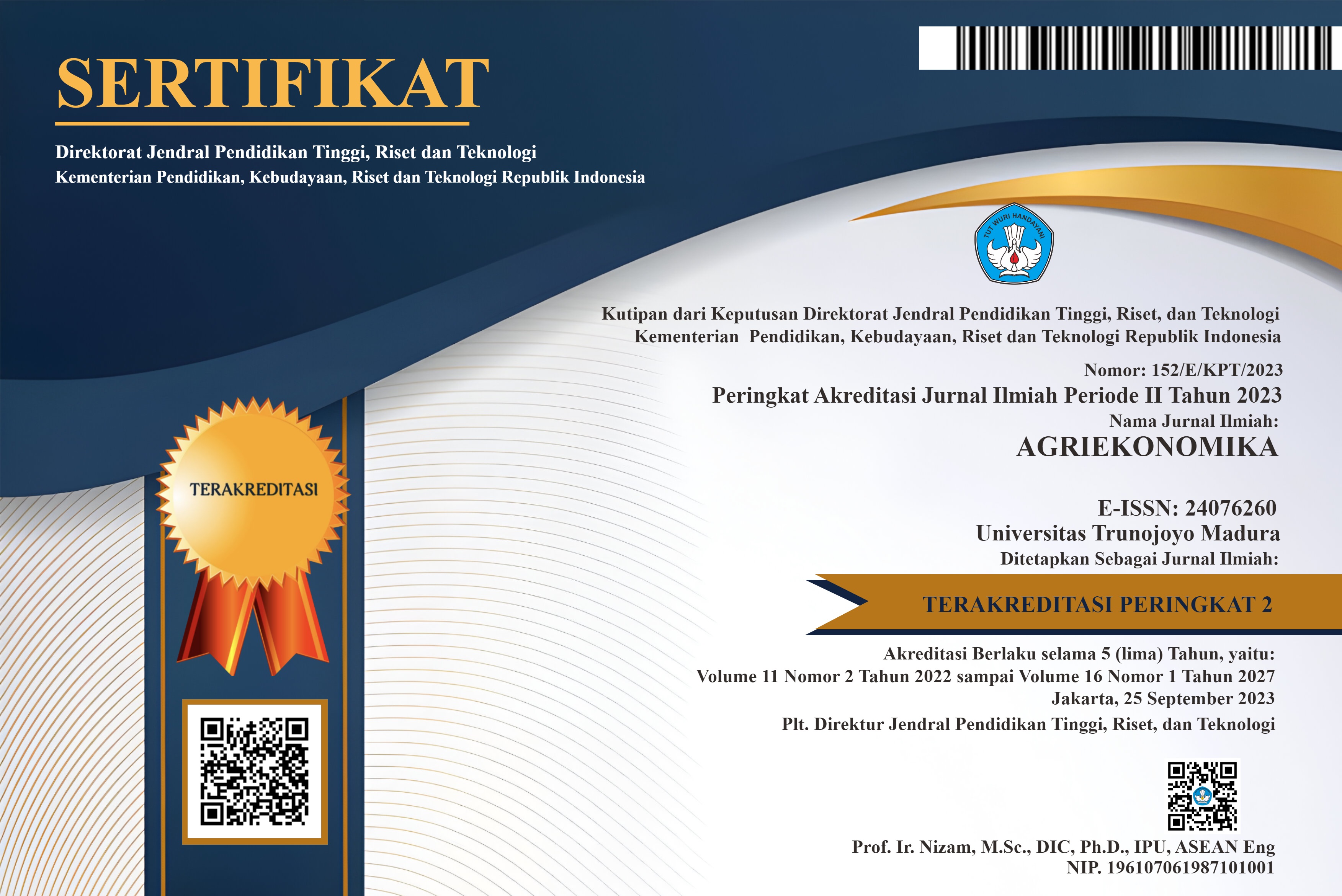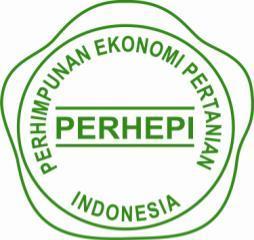INTENSI KEWIRAUSAHAAN MAHASISWA UNIVERSITAS TRUNOJOYO MADURA (ENTREPRENEURIAL INTENTIONS OF TRUNOJOYO UNIVERSITY of MADURA STUDENTS)
Abstract
ABSTRAK
Penelitian ini bertujuan untuk mengetahui karakteristik kewirausahaan mahasiswa Universitas Trunojoyo Madura (UTM) dan faktor-faktor yang mempengaruhi intensi kewirausahaan mahasiswa UTM. Dengan adanya pendidikan kewirausahaan diharapkan mahasiswa memiliki jiwa wirausaha serta wadah bagi mahasiswa untuk berwirausaha. Pendidikan kewirausahaan digunakan untuk menumbuhkan jiwa wirausaha dan memberikan bekal pengetahuan kepada mahasiswa supaya dapat menciptakan lapangan pekerjaan setelah lulus nanti. Metode analisis yang digunakan adalah diskriptif kualitatif dan analisis diskriminan. Hasil penelitian menunjukkan bahwa karakteristik jiwa kewirausahaan mahasiswa UTM mayoritas bercita-cita sebagai wirausaha sebesar 17% dan sisanya sebesar 83% bercita-cita sebagai PNS, dosen, jurnalis dan lain-lain. Sedangkan dari 8 variabel yang memiliki perbedaan yakni variabel efikasi diri, akses terhadap modal, latar belakang pendidikan dan latar belakang orang tua yang berpengaruh terhadap intensi kewirausahaan mahasiswa UTM karena memiliki nilai sig < 0,05.
ABSTRACT
The purposes of the study are to determine the enterpreneurship characteristic of students in University of Trunojoyo Madura and the factors that influence the enterpreneurship intention of students in University of Trunojoyo Madura. By the existance of enterpreneurship course, students are expected to have a spirit of enterpreneurship and will become the place for students to apply the enterpreneurship skills. Education on Enterpreneurship occurs for triggering the enterpreneurship interest and knowledge to students for establishing their own fields of job after graduating. Analysis method used is qualitative descriptive and discriminant analysis. The result of study shows that the characteristic of students’ enterpreneurship spirit who aspire to be enterpreneurs are 17%, Government officials, lecturers, journalis and etc are 83%. Further, the 8 variables that mostly have differences are self efficacy, capital access, background of study and family background variables. It is stated because the 8 variables above influences the students enterpreneurship intention on sig value < 0,05.
Keywords
Full Text:
PDF (Bahasa Indonesia)References
Barbara Farzier dan Linda S Niehm. (2008). “Students attitudes and intentions toward entrepreneurial careers”, Journal of family and consumer sciences.
Bygrave, W. D. (2003). The Portable MBA Entrepreneurship. Jakarta: Binarupa Aksara.
Galloway, L., Anderson, M. and Brown, W. (2006) ‘’Are engineers becoming more enterprising? A study of the potentials of entrepreneurship education’’, International Journal of Continuing Engineering Education and Lifelong Learning, 16, 5, 355–365.
Ghozali, Imam. (2005). Aplikasi Analisis Multivariate dengan Program SPSS. edisi 3, BP UNDIP, Semarang.
Indarti, N. dan Rostiani, N. (2008). Intensi Kewirausahaan Mahasiswa: Studi Perbandingan Antara Indonesia, Jepang dan Norwegia. Jurnal Ekonomika dan Bisnis Indonesia, Vol. 23, No. 4, Oktober.
Isdianto, B., Willy, D. &Mashudi, M.R. (2005). Orientasi Sistem Pendidikan Desain Interior terhadap Motivasi Kewirausahaan Mahasiswa (Mencari Hambatan dan Stimulus). Laporan Penelitian Bandung: Institut Teknologi Bandung.
Jumiadi, W. (2004). Analisis pengaruh perkembangan industri kecil pakaian jadi terhadap pengembangan wilayah Kota Medan. Tesis Magister Perencanaan Wilayah. USU. Medan.
Koesworo, Y., Sina. S. S., Nugeraheni, D. B. (2006). “Motivasi berwirausaha di kalangan mahasiswa: aplikasi theory of planned behavior”. Jurnal Ekuitas Vol 11, No. 2, 269 – 291.
Mazzarol T., T. Volery, N. Doss, dan V. Thein. (2006). Factor enhancing the effect of word-of-mouth onconsumer outcomes. Conference Paper. Diakses pada tanggal 4 November 2013.
Morello, Virginia Lasio, Dirk Deschoolmeester dan Elizabeth Arteaga Garcia, (2003). “Entrepreneurial Intention of Undergraduates at ESPOL in Equador.
Ranto, Basuki.(2007). Analisis Hubungan Antara Motivasi, pengetahuan kewirausahaan, dan kemandirian usaha terhadap kinerja pengusaha pada kawasan industri kecil di daerah pulogadung, Jurnal Usahawan No.10 TH XXXVI Oktober 2007.
Segal, Gary, Dan Borgia, and Jerry Schoenfeld. (2005). The motivation to become an entrepreneur. “International Journal of Entrepreneurial Behaviour and Research.
Setiyorini, Mamik. (2009). Pengaruh faktor kepribadian dan lingkungan terhadapkeinginan berwirausaha. Universitas Sebelas Maret Surakarta.
Sugiyono. (2006). Teknik Penelitian, Yogyakarta:Pines
Wahyuddin. (2004). Industri dan Orientasi Ekspor Dinamika dan Analisis Spasial, Muhammadiyah University Press, Surakarta.
Wijaya, Tony. (2007). Hubungan adversity intelligence dengan intensi berwirausaha. Jurnal Manajemen dan Kewirausahaan vol.9, No. 2, September 2007: 117-127.
Wijaya, Tony. (2008). “Kajian model empiris perilaku berwirausaha ukm DIY dan jawa tengah”. Jurnal Manajemen danKewirausahaan.
DOI: https://doi.org/10.21107/agriekonomika.v4i1.678
Refbacks
- There are currently no refbacks.







